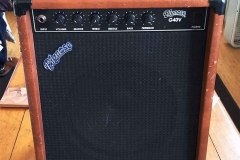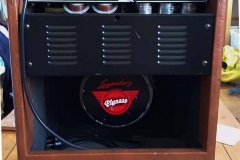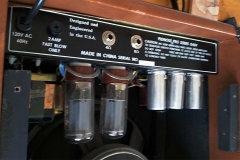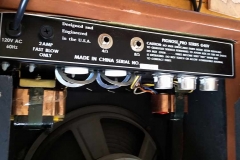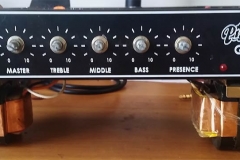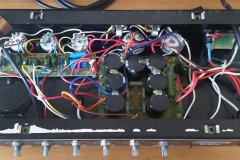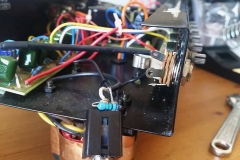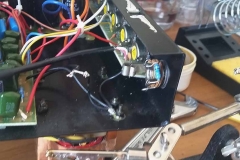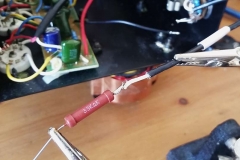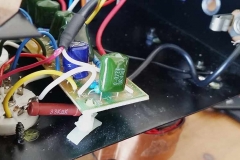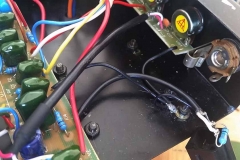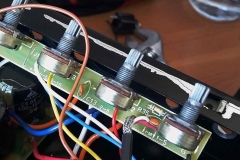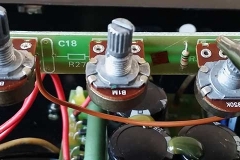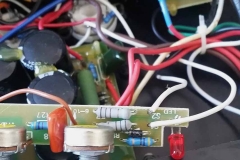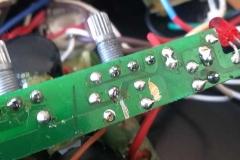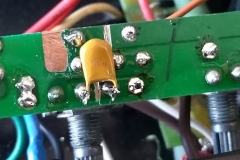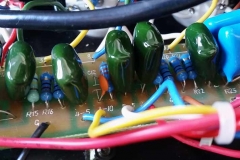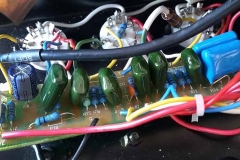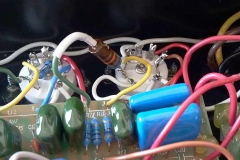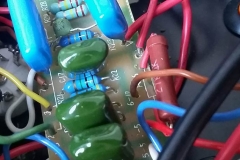Background
My best friend and possibly the reason I really picked up guitar in earnest, Nick Wan, has always been a gear hound. He’s also a little contrary, so he ends up looking past the really common pieces of gear and looks for the low-key wonders.
Over the last few years his interest has turned to a small 40 watt combo amp from Pignose. The G40V runs 6L6’s to drive a single 10 inch speaker. The amp was designed by Dennis Kager, who made some waves when doing work for Ampeg. The circuit is similar to a Bassman or early master-volume Marshall.
He eventually picked one up on Craigslist for a steal. While the amp sounded ok, he felt like it was lacking. He saw potential and decided on a handful of mods he wanted done. I’ve been Nick’s unprofessional guitar tech for years so he naturally turned to me to swap out the parts.
Mods
Nick found the mods while scouring forum posts about the G40V. I didn’t have to do much but follow a set of directions. I can’t seem to find the original conversation with a link to the posts that he found, but fortunately I copied all of the content into a couple of documents. I would love to link to the original posts, so shoot me the link if you have it.
These mods will reduce hum and background noise, revoice the amp to sound more like a 59 Bassman/Marshal JTM, tweak the presence control, and increase the increase the low-end output.
Parts List:
Resistors:
- 33 kOhm
- 68 kOhm
- 56 kOhm
- 27 kOhm
- 82 kOhm
All resistors are 1/2 watt or greater. The original post specified the value but used a special character that did not copy well. I’m assuming the special character refers to a fraction, and the most common fractional watt resistors are 1/4 and 1/2. I made an educated guess and the repairs seem to be holding up.
Capacitors
- 220 pF silver mica
- 47 pF 600V
- .1 uF 100V
- .1 uF
Misc:
- Shorting (NC) Switchcraft 1/4 inch jack
Reduce Background Noise and Hum
Most of the noise within the amp is related to how and where parts of the circuit are grounded. Step 1 was to replace the cheap plastic housing 1/4 inch jack with a nicer Switchcraft jack. They are drop in replacements and wired just like the original.
’59 Bassman / Marshall JTM Tone Mods
This is the most audible change to the circuit. The circuit follows a ’59 Fender Bassman circuit pretty closely.
First, a 33 kOhm resistor is wired in between the input jack and the grid of the first tube stage (Pin 2, Tube 1). This resistor, with the capacitance of the tub itself, will form a low-pass filter. The filter will not change the tone or gain significantly, but it will help prevent oscillations in the tube. The result should lower background noise and hiss, and some protection against radio signals making it through the gain stages and being heard in the final output.
A 68 kOhm resistor is then wired in to the same pin on the second tube. This resistor, along with the capicatance of the tube, will act as another low-pass filter, but with the increased resistance the cutoff frequency will be lower. The results should be a little bit of high-frequency attenuation to mimic the effect caused by the tone control of the Bassman.
The tone stack is next up. C12 is from 1000pF to 220pF, and as a result the cutoff for high freq control moved up. R19 increased from 33k to 56k, slightly attenuating lower frequencies, particularly the mids. C13 is a high frequency path to ground and is removed. R26 decreased from 100k to 27k and the presence control will now have a smaller maximum mid-boost.
Add 47pF cap between grids of power tubes.
Presence Control
The ground of the presence control was moved from the tone control board, which ultimately grounds to the input, to the power amp side of ground. This reduces noise from the power section feeding back into the input stages.
The 4.7 kOhm resistor that is in parallel to the presence pot is removed, and a .1 uF cap is connected between the wiper and ground.
Bottom Boost
Replace the 0.22 uF cap at C17 with a .1 uF 400V cap.
Review
My experience with Pig1
After finishing the mods on Pig1 I plugged the amp in and prayed I didn’t see smoke when I flipped the switch. Fortunately, all went well and I was able to slowly up the volume and test all of the controls through their whole range. Everything seemed normal and after running for about 30 minutes I figured the threat had passed. It was time to test it out.
I put a couple of hours of play time through the amp, playing through different gain settings and working the tone controls to find some really lush sounds. Most of my testing would have been done with a hot-rodded Epi LP Standard. I was able to cover some serious sonic territory from nice sparkly clean tones to really aggressive overdrive.
My favorite thing, though, was setting up my 20W JCM2000 combo in stereo. It was entirely too much sound for one small bedroom, but the stereo effect was amazing. I had dialed in each amp separately and their EQ’s were pretty different. While playing through riffs some sections would fit into the sweet spot on the Pig and ring out in one ear, then others would get the JCM going just right. The result was a swirling ping-pong effect that was really a lot of fun to play with.
Unfortunately, the amp didn’t still around too long and I had to break up the stereo setup to return the Pig to it’s rightful owner.
My experience with Pig2
A few years later Nick picked up a second G40V and wanted me to mod the amp in the same way. The second round of mods went smoothly until I powered it up and got no sound. Over the next few months I slowly poked at it, but it wasn’t until Nick was coming back into town that I had some real motivation and worked to get it up and running. It turns out I wired the input jack all backwards, and after 15 minutes with a soldering iron the amp was up an running.
Unfortunately, because I let the project sit so long, I didn’t get much chance to play it beyond going through some basic stress testing to make sure it wouldn’t blow when dimed. It sounded good from what I heard, but with only an hour or two I couldn’t cover as much ground as I had with Pig1.
Fortunately, Nick Wan is never more than a IM/Snapchat/whatsapp ping away.
Nick Wan’s thoughts with two years to compare
The first pig was modded sometime in 2013 and the second was finished summer of 2015, which has given its owner Nick Wan plenty of time to run it through it’s paces. I checked in to get his current thoughts on how they’re performing and how they compare.
NW:
really, pig2 cranked up to 3 o clock on volume and master
that’s where the cream is
unsure if i even found that on pig1
pig1 is just a great amp for the bedroom and if you want to play live over a drum you can
but pig2 is really that like… fender bassman hot rod feel
RC:
so pig2 is the badder of the two?
do you have a preference between the two?
NW:
mmm… i feel like i have more control over pig1
but pig2’s simplicity and power makes it more fun to play out off
if that makes sense
RC:
totally
the pig2 is an amp that you plug in because it sounds better to play through an amp loud sometimes
NW:
yeah correct. i can get the same sounds out of pig1
but just not the same attitude
and that’s hard to really measure by microphone
Demos
What good are a bunch of photos of resistors and capacitors if you never get to experience the most important part? Check out the samples below
Piggy #1
My best friend Nick Wan (of Farewell, Nick Wan) recorded his debut album Dainty entirely through the first modded Pig.
By Accident
A few comments from the man himself:
but all of Dainty was recorded with pig1
with the same guitar
just different pickup settings
mostly the same pedals — i think I was only using the 8bit and the rat
actually, from that album, by accident would be the best representation of just the amp
i went all-clean for that song, for the most part
except for the end
which is split between the rat signal in one ear and the 8bit in the other
King Creep
Thoughts from NW:
king creep probably 2nd
but that has a little more effects throughout
not 100% clean amp until the end
Lies
One of my favorite tracks from Dainty is Lies, a short instrumental interlude. It’s clean and raw and has a great flow. It’s also a good example of a more or less direct path from guitar to amp. A little reverb was added in post, but other than that it’s just the guitar and amp.
NW:
oh, that’s… just guitar through amp. but there’s some post
stuff on it
so the reverb is digital
which isn’t my style tbh
but it matched it
also it’s 100% neck pickup i believe
Piggy 2
The second pig hasn’t been featured on an album just yet, though I have gotten a couple early demos from the next project. There are no recordings just yet, but Mr. Nick Wan himself has promised to get some tracks over to me when he’s not too busy finishing his PhD, interviewing for sports statistician jobs, live coding, and running his neuroscience blog.


